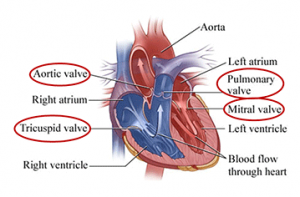Heart is a mechanism with various ways to keep the flow synchronized and get it working, now when concerned about proper blood flow, it is compulsory for the blood to go against the gravity, so it is necessary for our heart to have pressure. But when applied pressure there is a 100% chance that the blood can go anyway it wants to, so when the deoxygenated blood comes from vena cavas to the right atrium then to the right ventricle and then to the pulmonary artery, there are chance that if pressure is applied, for the blood to flow to the pulmonary artery, the blood may go back to the right atrium. And that’s when the valves come into work, when pressure is applied to the blood so it can go against gravity, valves act as a gate to restrict blood from moving anywhere else except the place it is supposed to go to. For example when talking about deoxygenated blood, when the blood wants to go to the pulmonary artery from our right ventricle, there is tricuspid valve present between right atrium and right ventricle to restrict the blood from going back to the right atrium. There are 4 type of valves in the heart which are visible in the diagram below.

But valves can malfunction, which can lead to some serious circulatory diseases, to be specific, heart valve disease. There are 2 main situation which can or may result in heart valve disease. The first one is regurgitation. This name is given to leaking heart valve, where valves don’t close all the way to restrict the blood from flowing anywhere else. Which can result in blood flowing backwards. Regurgitation can also put strain on your heart, as it can make your left ventricle works harder to pump extra blood that has come back into the heart because of malfunctioned valves. The unsynchronized flow of blood because of dysfunctional valve can also build up fluid in the lungs.
The second situation where it may result in heart valve disease is stenosis. Stenosis is more likely to occur when people have heart valve disease as stenosis comes when people age. Stenosis happens when our valve thicken due to calcium and other nutrients. Which at the initial stages are good as muscles have more strength, but then as time passes and the valve gets thicker and thicker with extreme build up of nutrients and calcium. This will limit the flow of blood as the valve will not open and close nicely, and if there is low flow of blood, then over time our heart will get weak and tired as it gets the same amount of blood every time, but has slow blood flow. It can also result in parts of our body to get less blood, which results in weakness.
The reason people may get the disease are first your age, because as you age, the shape and flexibility of your valve can change; calcium and other deposits can also thicken or stiffen the flaps of the valves. Which may result in stenosis. Then infections of the valves also known as endocarditis, rheumatic fever and many more.
When you have heart valve disease, its symptoms come along with it like Chest pain, irregular heartbeat, Shortness of breath, difficulty catching your breath, weakness, inability to maintain regular activity level, repeated loss of consciousness ,Swollen ankles, feet or abdomen. Heart valve disease can damage your nervous system as one of the most common symptom of heart valve disease is irregular heartbeat which results in strokes. Heart valve can also result in damage of respiratory system as this disease can result in fluid in your lungs.
When it comes to diagnosing heart valve disease, it is usually diagnosed in an exam when when the doctor listens to the heart and hears a heart murmur. THe doctor can also see your size of valve and how is your heart pumping. Other diagnosis may include an echocardiogram, stress or regular electrocardiogram (EKG),chest X-ray and many more.
For the treatment of disease, there are many option like When possible, it’s generally best to repair a valve and preserve a person’s own tissue in the heart. However, when the tissue is too damaged, a replacement valve may be used from another human heart, an animal or a manufactured mechanical valve. FOr type of valve replacements there are
Mechanical valve – where a long-lasting valve made of durable materials is replaced with your real valve
Tissue valve- which may include human or animal donor tissue
Ross Procedure — “Borrowing” your healthy valve and moving it into the position of the damaged valve aortic valve
TAVI/TAVR procedure — Transcatheter aortic valve replacement
But there are impacts of the following surgery option too. Like a social impact could be that you could lose the person who had the surgery, because usually our WBC may reject the foreign particles, which may lead to malfunction of valves too. Another impact is a economical impact where these surgery cost a lot of money. And a political impact could be that corruption could play a part in the surgery, where when a heart valve is open to donation, rich people come first in the line as they pay extra money.
To conclude I would say that heart valve disease is a very serious disease, which may result in many damages to many of your system, so if you point out any symptoms mentioned above please contact your doctor immediately. THank you for giving me your time and bye.